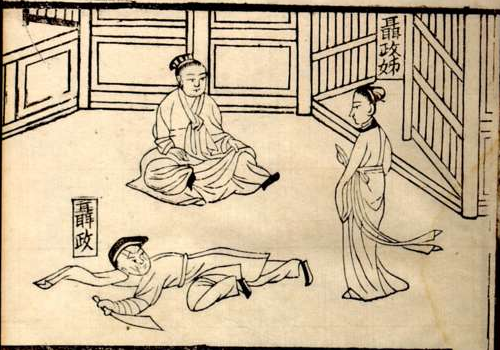|
Wang Zhaoyuan (scholar)
Wang Zhaoyuan (王照圓 ;Shandong, 4 October 1763–1851) was a Chinese female Confucian scholar and writer. Unusually for a woman scholar, she was distinguished by her philological scholarship, not poetry. Her main work consists of annotations to Liu Xiang's (79-8 BCE) ''Biographies of Exemplary Women'' ( Lienü Zhuan) and the ''Lives of the Taoist Transcendents'' (Liexian Zhuan). She also shared Liu Xiang's interest in the interpretation of dreams.Junjie Huang, Erik J. Zürcher ''Norms and the State in China'' Chapter - The Propagation of Female Idealsp.101/ref> Works *Annotations to Liu Hsiang's Liexian Zhuan The ''Liexian Zhuan'', sometimes translated as ''Biographies of Immortals'', is the oldest extant Chinese hagiography of Daoist ''xian'' "transcendents; immortals; saints; alchemists". The text, which compiles the life stories of about 70 mytholog ... *Annotations to Liu Hsiang's Lienü Zhuan *''Book of Dreams'' (梦书 Meng Shu) References 1763 births 1851 deaths< ... [...More Info...] [...Related Items...] OR: [Wikipedia] [Google] [Baidu] |
Shandong
Shandong ( , ; ; alternately romanized as Shantung) is a coastal province of the People's Republic of China and is part of the East China region. Shandong has played a major role in Chinese history since the beginning of Chinese civilization along the lower reaches of the Yellow River. It has served as a pivotal cultural and religious center for Taoism, Chinese Buddhism and Confucianism. Shandong's Mount Tai is the most revered mountain of Taoism and a site with one of the longest histories of continuous religious worship in the world. The Buddhist temples in the mountains to the south of the provincial capital of Jinan were once among the foremost Buddhist sites in China. The city of Qufu is the birthplace of Confucius and was later established as the center of Confucianism. Confucianism developed from what was later called the Hundred Schools of Thought from the teachings of the Chinese philosopher Confucius. Shandong's location at the intersection of ancient and modern n ... [...More Info...] [...Related Items...] OR: [Wikipedia] [Google] [Baidu] |
Liu Xiang (scholar)
Liu Xiang (77–6BCE), born Liu Gengsheng and bearing the courtesy name Zizheng, was a Chinese astronomer, historian, poet, politician, librarian, and writer of the Western Han Dynasty. Among his polymathic scholarly specialties were history, literary bibliography, and astronomy. He is particularly well known for his bibliographic work in cataloging and editing the extensive imperial library. Life Liu Gengsheng was born in Xuzhou. Being a distant relative of Liu Bang, the founder of the Han dynasty, he was thus a member of the ruling dynastic clan (the Liu family). Liu Xiang's father ranked as a marquess. Liu Xiang's son, Liu Xin, would continue the scholarly tradition of his father and his relative Liu An (the Prince of Huainan). By the beginning of Han Yuandi's reign, Liu Xiang was a member of a group of Confucian officials, including Xiao Wangzhi, who wished to limit the power of the emperor's female family members relatives' clans, the Shi and the Xu. He ended up on the ... [...More Info...] [...Related Items...] OR: [Wikipedia] [Google] [Baidu] |
Lienü Zhuan
The ''Biographies of Exemplary Women'' () is a book compiled by the Han dynasty scholar Liu Xiang c. 18 BCE. It includes 125 biographical accounts of exemplary women in ancient China, taken from early Chinese histories including '' Chunqiu'', '' Zuozhuan'', and the ''Records of the Grand Historian''. The book served as a standard Confucianist textbook for the moral education of women in traditional China for two millennia. Description The idealized biographies are divided into eight scrolls, including the eighth addendum from an unknown editor, as shown below. This book follows the ''lièzhuàn'' (列傳 "arrayed biographies") biographical format established by the Chinese historian Sima Qian. The word ''liènǚ'' (列女 "famous women in history") is sometimes understood as ''liènǚ'' (烈女 "women martyrs"), which Neo-Confucianists used to mean a "woman who commits suicide after her husband's death rather than remarry; woman who dies defending her honor." The online C ... [...More Info...] [...Related Items...] OR: [Wikipedia] [Google] [Baidu] |
Liexian Zhuan
The ''Liexian Zhuan'', sometimes translated as ''Biographies of Immortals'', is the oldest extant Chinese hagiography of Daoist ''xian'' "transcendents; immortals; saints; alchemists". The text, which compiles the life stories of about 70 mythological and historical ''xian'', was traditionally attributed to the Western Han dynasty editor and imperial librarian Liu Xiang (77–8 BCE), but internal evidence dates it to the 2nd century CE during the Eastern Han period. The ''Liexian Zhuan'' became a model for later authors, such as Ge Hong's 4th century CE '' Shenxian zhuan'' ("Biographies of Divine Immortals"). Title ''Liexian Zhuan'' combines three words: *''liè'' (, "rank; array; order; line up; list") * ''xiān'' (, "transcendent being; celestial being; 'immortal'") *''zhuàn'' (, " tradition; biography; commentary on a classic (e.g., '' Zuozhuan'')"(—cf. ''chuàn'' (, "transmit; pass along; hand down; spread") The compound ''lièzhuàn'' (, lit. "arrayed lives") is a Classic ... [...More Info...] [...Related Items...] OR: [Wikipedia] [Google] [Baidu] |
1763 Births
Events January–March * January 27 – The seat of colonial administration in the Viceroyalty of Brazil is moved from Salvador to Rio de Janeiro. * February 1 – The Royal Colony of North Carolina officially creates Mecklenburg County from the western portion of Anson County. The county is named for Queen Charlotte of Mecklenburg-Strelitz, who married George III of the United Kingdom in 1761. * February 10 – Seven Years' War – French and Indian War: The Treaty of Paris ends the war, and France cedes Canada (New France) to Great Britain. * February 15 – The Treaty of Hubertusburg puts an end to the Seven Years' War between Prussia and Austria, and their allies France and Russia. * February 23 – The Berbice Slave Uprising starts in the former Dutch colony of Berbice. * March 1 – Charles Townshend becomes President of the Board of Trade in the British government. April–June * April 6 – The Théâtre du Palais-R ... [...More Info...] [...Related Items...] OR: [Wikipedia] [Google] [Baidu] |
